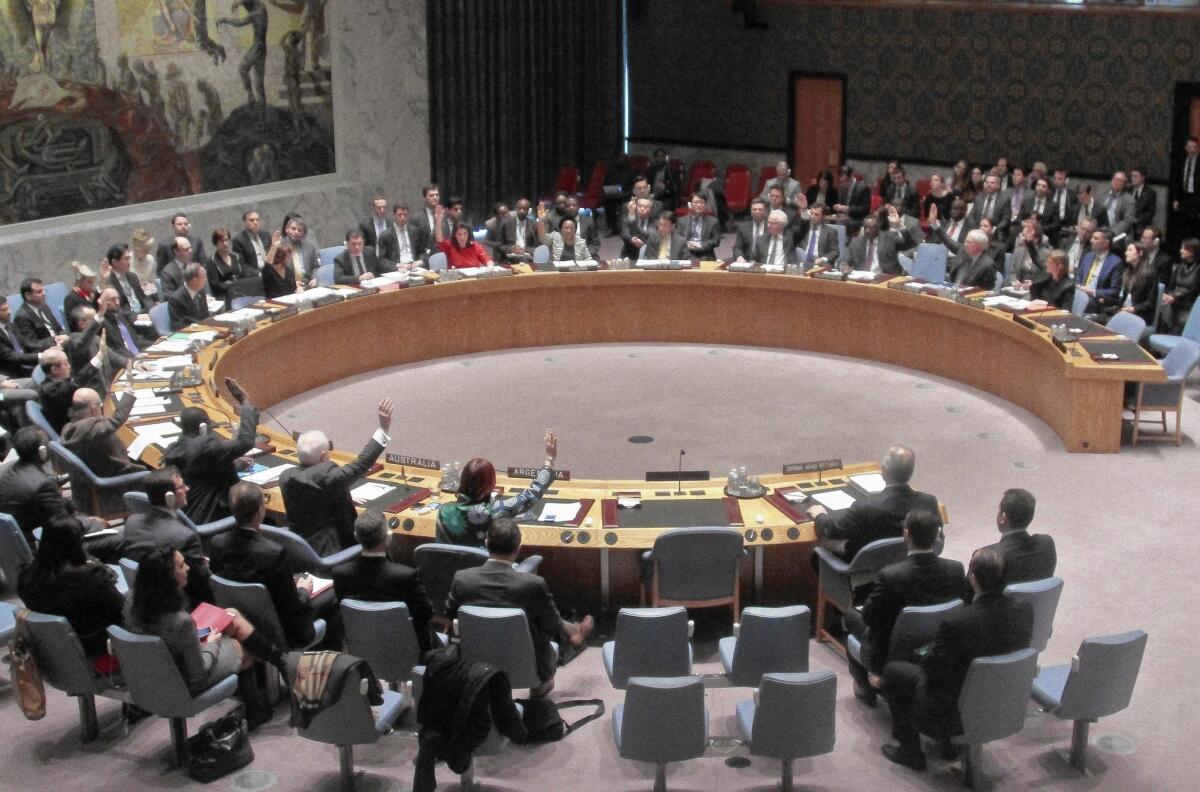U.N. calls for improved humanitarian aid access in Syria

- Share via
BEIRUT — The United Nations on Saturday called for improved humanitarian access for millions of needy Syrians as Syrian government forces pounded rebel positions and the latest car bomb apparently linked to the civil war exploded in neighboring Lebanon.
The U.N. Security Council resolution, passed unanimously in New York, demanded that “all parties, in particular the Syrian authorities, promptly allow rapid, safe and unhindered access” for humanitarian assistance, including aid across conflict zones and via international borders.
Earlier, U.S.-backed drafts of the measure that threatened sanctions against the Syrian government for noncompliance were dropped at the insistence of Russia, which, as a permanent member of the Security Council, can exercise veto power.
Russia and its ally, Syria, have voiced concern that the humanitarian issue could be used as a pretext for international intervention against the government of President Bashar Assad. Still, Saturday’s resolution was considered a diplomatic breakthrough. Previous Syria-related resolutions in the Security Council had met vetoes from Russia and China.
In a statement, U.S. Secretary of State John F. Kerry said the resolution “could be a hinge-point in the tortured three years of a Syria crisis bereft of hope.”
Nonetheless, it was unclear whether the U.N. move would have anything beyond a symbolic effect for millions of desperate Syrians in need of aid. The humanitarian scenario in Syria is deteriorating rapidly as the conflict nears its three-year anniversary.
Half of Syria’s population of 23 million is in need of “urgent assistance,” including food, shelter and medical care, according to the U.N., while more than 2.5 million Syrians are refugees outside the nation’s borders. Almost a quarter of a million live in areas of Syria cut off from aid and besieged by one side or the other in the fighting, the U.N. says.
The Syrian government and the opposition have traded blame for the escalating humanitarian catastrophe. Both sides share responsibility, said Valerie Amos, the U.N.’s top humanitarian official.
“Syrian government and allied militias have been responsible for countless killings, disappearances, the horrendous use of barrel bombs and torture on a massive scale,” Amos said Saturday, the allusion to barrel bombs referring to metal drums filled with explosives dropped from aircraft. “Opposition groups have carried out summary executions, the recruitment of children for combat and the use of terror tactics in civilian areas.”
The resolution called on U.N. Secretary-General Ban Ki-moon to report in 30 days on any progress in carrying out the Security Council’s demands for humanitarian access and a cessation of violence.
In Syria, meanwhile, the military continued its attacks on fractured rebel forces across a broad swath of the country, including near the capital, Damascus, in central Homs province and in the northern city of Aleppo. The U.S.-backed opposition has been on the defensive for months. Rebels, including Al Qaeda-affiliated factions, have been pushed back in key strategic zones, including the critical suburbs of Damascus.
Government and opposition accounts said the military was advancing on the rebel-held city of Yabroud, in Homs province near the Lebanese border. Yabroud is the last opposition stronghold in the rugged Qalamoun mountains, a strategic corridor close to the country’s major north-south highway between Damascus and Homs.
In Lebanon, authorities reported that a car bomb exploded Saturday at an Army checkpoint in the city of Hermel, along the Syrian border in the northeast Bekaa Valley. At least three were killed in the suicide attack, including two soldiers, and more than a dozen people were wounded, according to reports here. It was at least the third car bomb this year in Hermel. The mostly Shiite Muslim city is largely supportive of Hezbollah, the Shiite group that has sent militiamen to Syria to fight on behalf of Assad’s government.
The attack was the latest in a series of suicide car bombings targeting pro-Hezbollah areas in Lebanon. Al Qaeda-affiliated Sunni Muslim factions in Syria opposed to Assad’s rule have claimed responsibility for the bombings, including Saturday’s attack.
More to Read
Sign up for Essential California
The most important California stories and recommendations in your inbox every morning.
You may occasionally receive promotional content from the Los Angeles Times.










